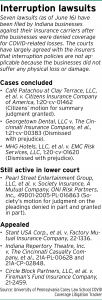Subscriber Benefit
As a subscriber you can listen to articles at work, in the car, or while you work out. Subscribe NowAttorneys representing businesses fighting their insurance carriers over interruption insurance claims are continuing to argue over the meaning of “physical loss and damage,” but some are also contending that the losses linked to COVID-19 are covered when the policy does not contain a virus exclusion provision.

“What’s the policyholder supposed to think when they say there’s an exclusion available approved by a state regulator for them to use in their policies and they don’t put it in their policy? What does that mean?” George Plews, partner at Plews Shadley Racher & Braun LLP in Indianapolis, queried. “Insurance companies say, ‘Well, you don’t create coverage with an exclusion.’ But we say to understand the scope of the coverage, you have to look at what’s in there and also what’s not in there.”
Plews is part of the legal team representing the Indiana Repertory Theatre in its dispute with its insurer, The Cincinnati Casualty Company. The Marion Superior Court ruled in favor of the insurer, but the IRT has filed two appeals with the Court of Appeals of Indiana and has petitioned for transfer to the Indiana Supreme Court.
Cincinnati Casualty declined to let its attorneys at Dentons Bingham Greenebaum LLP comment on the litigation.
After the city of Indianapolis and the state of Indiana ordered all nonessential businesses to suspend operations in March 2020 to slow the spread of the coronavirus, the IRT ended its season and filed an insurance claim to cover the loss of its income. Three days later, Cincinnati indicated it would not be providing payment because the theater did not sustain any “direct physical loss or damage” to its property.
 The Marion Superior Court granted the defendant’s motion for summary judgment because the IRT building was not structurally altered by the virus. Also, the court found the absence of a virus exclusion in the IRT policy to be moot.
The Marion Superior Court granted the defendant’s motion for summary judgment because the IRT building was not structurally altered by the virus. Also, the court found the absence of a virus exclusion in the IRT policy to be moot.
Around the country, state and federal courts have reached similar conclusions in the hundreds of lawsuits filed over denied business interruption claims.
The online tracker of these cases created by the University of Pennsylvania Carey Law School shows that insurers have been successful at getting either the complaints dismissed or motions for summary judgment granted. A smaller number of the litigated policies do not have virus exclusions, but the insurance companies still appear to be getting those lawsuits tossed at the trial court level, although policyholders secured a few more summary judgment wins.
Pollution exclusion
Cincinnati Casualty, just like other insurance companies facing interruption coverage lawsuits, has argued losses are covered only when the property has been tangibly physically altered. The insurer pointed to several rulings on COVID-19 disputes in which the courts agreed with that interpretation of the policy language.
Also, in an amicus brief, the American Property Casualty Insurance Association maintained that because the IRT cannot make an interruption claim because its property did not suffer a physical loss or damage, the “absence of an exclusion is irrelevant.”

However, Plews and Gregory Gotwald, Plews Shadley managing partner, countered that the coronavirus physically alters the indoor air. Even though the contaminant can be wiped away with a disinfectant from surfaces, the air is again damaged when someone enters the room.
During previous pandemics and the SARS epidemic, insurers paid “fairly substantial amounts of money,” Plews said, to settle claims based on the notion of potential injury from airborne diseases.That spurred the industry to develop an exclusion for viruses.
Also, highlighting the development of Indiana’s caselaw on pollution exclusions included in insurance policies, Plews and Gotwald said virus exclusions will likely have to become more specific than they currently are in order to shield the insurance carrier.
The pollution exclusions started very general, with a “pollutant” defined as any kind of solid, liquid, gas or, as Plews said, “everything except base neutral water.” Through litigation — namely Am. States Ins. Co. v. Kiger, 662 N.E.2d 945 (Ind. 1996), and State Auto Mutual Ins. Co. v. Flexdar, Inc., 964 N.E.2d 845 (Ind. 2012) — Hoosier courts have ruled exemptions cannot be overly broad.
“That’s partly what drives our particular approach to this case,” Plews said. “We know that what we have done in the past is required folks to say what they mean. (Insurers must) clearly identify for the policyholder what it is they’re excluding so (the consumer) can make choices.”
Mistaken statement
Plews and Gotwald also are arguing in the IRT lawsuit that the third edition of the popular insurance treatise, “Couch on Insurance” by Steven Plitt, contained a significant error that is providing a faulty basis for many court rulings on COVID-19 cases. Specifically, the book holds a claim for “physical loss or damage” must include a “distinct, demonstrable, physical alteration of the property.”
A 2021 law journal article co-authored by Plews Shadley associate Christopher Kozak examined the language in the third edition and found “Couch” inferred the physical alteration test from a single district court ruling and “got the law so profoundly backwards.”
The argument that the treatise misspoke is recapped in the IRT’s transfer petition to the Supreme Court.

Cincinnati Casualty brushed off the focus on “Couch” in its response brief, calling the journal article “an advocacy piece” and the argument “flawed.”
Moreover, the defendant countered that Plitt has not subsequently backed away from the definition in the third edition. Instead, the author has since determined that,“If an overnight cleaning with a disinfectant soap and water is enough, policyholders may have difficulty establishing physical damage or loss” due to COVID-19.
The Plews Shadley team pointed to the evolving understanding of the coronavirus and said the courts have gotten ahead of the science because of their reliance on “Couch.”
Plews and Gotwald said the mistake in “Couch” is being compounded in the courts. As judges rule against policyholders on their COVID-19 claims, they are often citing to the insurance treatise.
“You get an early court that will make the offhand comment that the virus doesn’t harm property, it harms people or you can just wipe it off,” Gotwald said. “And then another court comes along and just cites to that without looking at the allegations that were actually made. … But as science evolved, (our previous understanding of COVID-19) is not exactly accurate. Now when those allegations are being made, the courts are saying, ‘It doesn’t matter what your factual allegations are, look at all these cases that say, you can just wipe it up.’”•
Please enable JavaScript to view this content.
